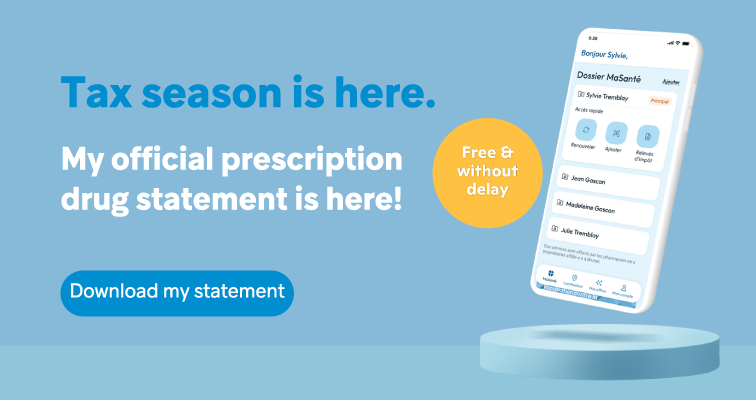When medication is properly prescribed and taken as recommended, it is mostly beneficial to one’s health. On the other hand, when it is misused or taken in larger doses than prescribed, it can cause serious damage. Here’s how you can reduce the risks of drug intoxication for you and those around you.

1
Respect the recommended dosage of your medications
Always respect the dosage prescribed by your health care professional or follow the instructions on the label of any medication you take. Never increase the dose or dosage without first consulting your pharmacist or your doctor.
2
Keep an updated list of the medication you are taking
Include any allergies to medication or side effects you have experienced in the past. Show this list to your health care professionals before taking a new medication.
3
Store your medication in a safe place
Keep your medication (both over-the-counter and prescription) as well as your natural health products together in a cool, dry place. Always keep them out of the reach of children and pets.
4
Clean out your medicine cabinet
Go through your medicine cabinet regularly and return all expired or unused drugs to your pharmacy where they will be disposed of appropriately. Never throw medication out in the trash or flush them down the toilet.
5
Always talk to your pharmacist before giving medication to a child
Always check with your pharmacist before giving over-the-counter medication to a child. He can tell you if the medication is appropriate and advise you on the dosage according to the child’s age and weight.
6
Don’t trade medication
Never take a medication that is not intended for you and never give your medication to someone else unless recommended by your pharmacist or doctor.
7
Keep the number for the poison control helpline close-by
In case of drug intoxication, time is definitely of the essence to reduce the risks of damaging consequences. If you witness an intoxication or suspect one, you must act very quickly and call the poison control helpline at 1-800-463-5060.
« All medications and natural health products can cause serious side effects or interactions with other medications. Carefully read the instructions, warnings and patient information leaflets provided by the manufacturer and consult your pharmacist when purchasing any medications or natural health products. Keep out of the reach of children. »
What to do in case of a drug intoxication
The medical treatment of a drug intoxication is a complex process influenced by a number of factors: the drug’s chemical properties, the ingested dose, the person’s age, weight and state of health, the time between ingestion and the time it was first noticed, etc. You must never try to treat intoxication on your own. Always call on the expertise of professionals.
Here’s what you need to do:
- If the person is drowsy or unconscious, put them on their left side, in the lateral security position, to avoid vomiting and choking.
- Don’t leave the person by themselves or unsupervised;
- Don’t give them anything to eat or drink unless directed by a doctor;
- Don’t try to make them vomit;
- If someone is presenting with symptoms of drug intoxication, call 911 immediately. It is preferable for the person to travel in an ambulance. However, in some cases, especially if the person is conscious and it will save time, it may be preferable to drive to the closest emergency room;
- If the person is not exhibiting specific symptoms, call the poison control helpline in your region. A health care professional will evaluate the situation and advise you on what to do.
